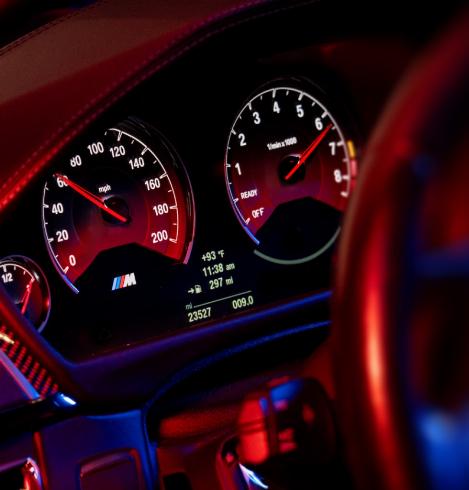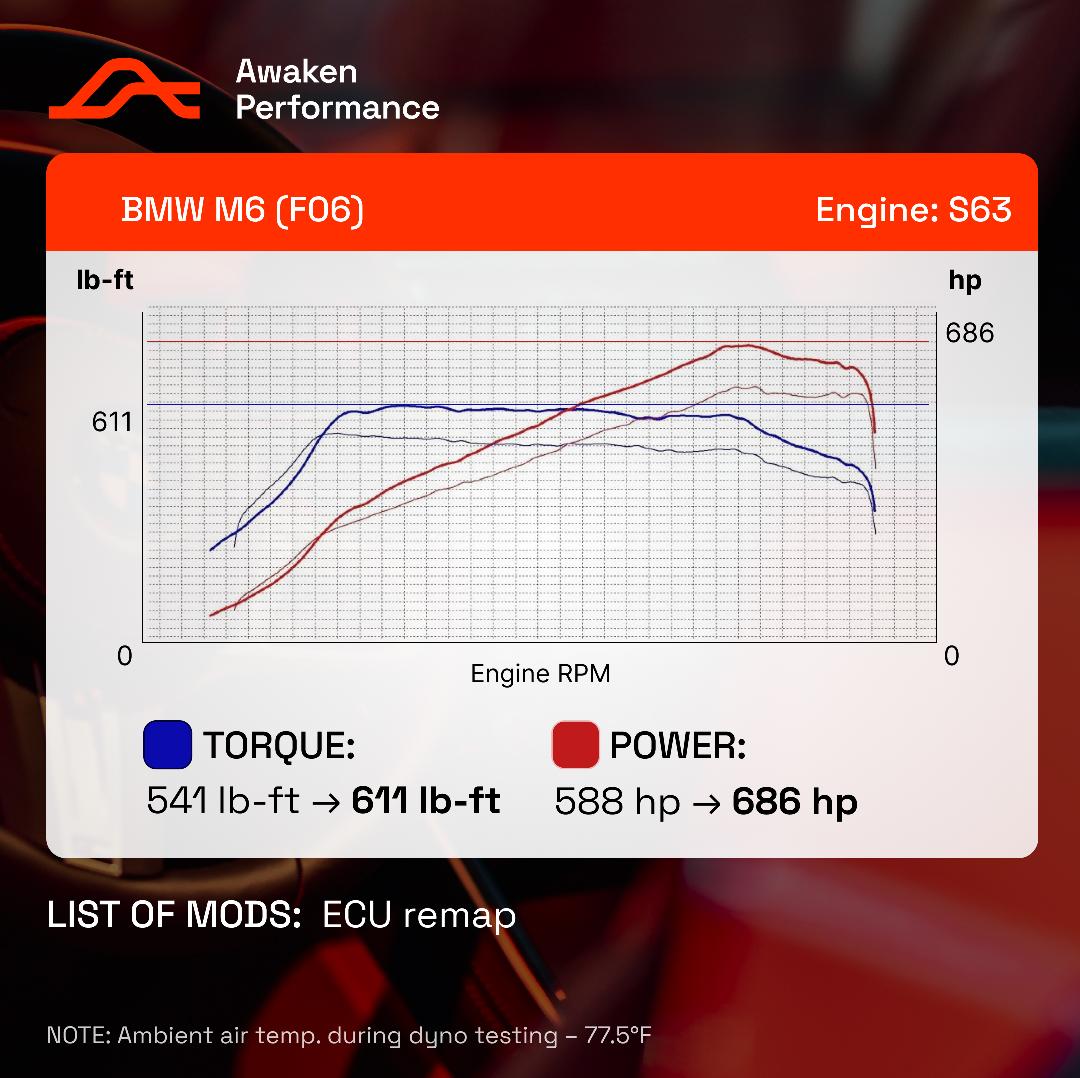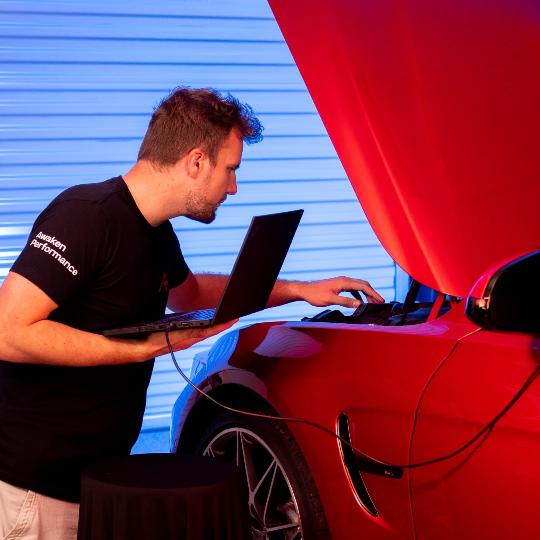[[post.title]]
Apr 25, 2024

| Summary in a nutshell: |
| Increasing everyday performance in a reliable manner is the main goal of Awaken Performance Engine Tuning. Our testing on the BMW S63 engine showed significant power & torque gains, decreased engine operating temperatures (contributing to enhanced longevity), and better fuel economy. In this article we explore the test results in detail and explain our ECU tuning process, helping you decide if it’s worth it for you. |
Ahhh, BMW V8 engines… Although they aren’t famous for their longevity, they sure sound EARGASMIC! And this is exactly the case with the BMW S63, which we’ll be looking at in this article. Contrary to popular belief, it isn’t too bad when it comes to its dependability – but we know a way to make it even more reliable! Curious what it is?
Join us as we explore our Awaken Performance BMW S63 engine tuning test results!
Coming up:
Let’s dive right in!
 Okay, okay, I’ll admit: obviously the V8 layout isn’t the domain of just BMW.
Okay, okay, I’ll admit: obviously the V8 layout isn’t the domain of just BMW.
Chevy’s LS7, Chrysler’s HEMI, or some more modern designs of the bunch like Jaguar’s AJ-V8 and Ford’s Voodoo – all of them sound amazing. But if you take a look at what Europeans put in their cars nowadays… Ugh, let’s just cherish the fact that Bavarians still use a 4.4L engine that isn’t an inline-four!
Talking about displacement: it’s a good moment to take a brief look at the BMW S63 itself.
The BMW S63 engine was introduced in 2009, one year after the BMW N63 it’s based on went into production. While both the “civilian” N and “high-performance” S versions of this V8 share a lot design-wise, there are some key differences between them.
Starting with the similarities, the two engines:
In 2012 and later versions of N63 and S63, BMW started using their Valvetronic variable valve lift system, which made the S63 the first BMW M engine to take advantage of this technology.
Interestingly, the BMW S63 was the very first mass-produced engine to use the “hot-vee” configuration. But why did they decide to go for it in the first place? Mainly to improve the turbo spool time (providing boost earlier on) and keep the entire engine package compact. There is one inherent downside to this design though, which is even partially included in its name – it can get quite hot. But more on that in a bit.
As for the differences: the M-specific version uses twin-scroll turbochargers instead of the regular ones and its exhaust manifold is pulse-tuned. In simple terms, this means that its internal geometry has been optimized to allow for a nearly constant flow of the exhaust pulses into the turbochargers.
Depending on the variant, the BMW S63 makes up to 627 hp and 553 lb-ft (750 Nm) of torque in its stock form. If you’d like to know what car models were powered by this engine, check out the table we prepared below.
| Engine code | Power & torque | Car models |
| S63B44O0 | 547 hp / 502 lb-ft (680 Nm) |
|
| S63B44T0 | 553 hp / 502 lb-ft (680 Nm) |
|
| S63B44T2 |
567 hp / 553 lb-ft (750 Nm) |
|
| S63B44T4 | 591 hp / 553 lb-ft (750 Nm) |
|
That’s quite a long application list – not too shabby for a high-performance V8 engine. But how does it fare in terms of longevity? Does its practicality actually match the widespread use under the hoods of top-of-the-line BMWs?
Have you heard the expressions about not asking a woman her age or a man his salary? Well, the same goes for the BMW S63 engine – don’t ask it if it’s reliable, because the answer is both “yes” and “no.” Let me explain…
Current production S63s are very reliable and have A TON of BMW ECU tuning potential, due to how much power and torque reserves they possess. However, the initial versions of the BMW S63 and even more so the regular N63 were in fact quite problematic. Combine that with the fact that their predecessors, the N62 and S65 also weren’t kings of reliability, and you might see where this reputation comes from.
What were the main BMW N63 engine problems in its early iterations?
Again, most if not all of these were already resolved following a few major technical updates in 2012, 2016, and 2018. While BMW S63 engine problems weren’t as major as the ones that the N63 faced, the revisions also affected the M powerplant, positively impacting its reliability and performance.
But it doesn’t mean the improvements end there.
Without further ado: let’s take a look at our test results for the BMW S63 engine.
More specifically – the unit powering a beautiful BMW M6 Gran Coupe (F06) that we had the opportunity to tune with Awaken Performance. Similarly to the M3 (F80) we tested in the BMW S55 engine tuning case study, we took it on a dyno and logged it both prior to and after installing the tune.
This time we also took it for a longer spin out on the road and tested the… MPG. Yeah, I know: fuel economy is not something everyone’s thinking about when buying a large V8, but our results will surprise you!
For the sake of our testing process, we decided to take a close look at the things that will be the most important for you, potential Awaken Performance customers. This means the holy trinity of:
Let’s start with how much juice we managed to squeeze out of the car. According to BMW’s factory claims, the M6 (F06) should be making 553 hp and 502 lb-ft (680 Nm) of torque. Of course, Bavarians underrated their car as they always do – we clocked it in at 588 hp and 541 lb-ft (733 Nm) of torque estimated at the crank. Stock.
Fast forward a couple of hours later and with the Awaken Performance BMW engine tuning, we measured an impressive 686 hp and 611 lb-ft (828 Nm) of torque. And that’s with just the remap, no supporting hardware mods were included. All through the means of increased boost pressure from the turbocharger.
If this leaves you wondering how’s the reliability of the engine afterward, we also logged the car to see how it fares with a stronger blowing turbo. The engine coolant temperature dropped from the stock 207°F (97°C) to 189°F (87°C). For the remaining temperatures, i.e., of the engine itself and the exhaust gasses, we witnessed decreases from 205°F (96°C) to 187°F (86°C) and 1229°F (665°C) to 1006°F (541°C).
To achieve these results, apart from lowering the thermostat activation temperature and making the radiator fans turn on quicker, we adjust the fuel mixture of our tunes, so that it’s much more precise. This brings us to the final improvement brought by the Awaken Performance ECU remap – the gas mileage.
Before the tuning, the BMW M6 we used was able to achieve 21 MPG on average (combined city and highway cruising during our test). When we took it out for a drive after the new engine map was installed, we managed to get 26 MPG while maintaining the same driving style and route.
In the long term, you could save a lot of money with such a 24% improvement in fuel consumption. That is assuming the average cost of premium gas at around $3.88 per gallon and the average yearly mileage of 15,200 miles, you could achieve annual savings of up to around $540.
If you ask us, with the price of $599 for the tune, this seems like more of an investment than an impulse purchase that your significant other could dislike. Just sayin…

 So, you want that extra “oomph” for your BMW S63 engine. Or maybe even the economic aspect convinced you. Well, Awaken Performance Remote ECU Tuning Service should be your go-to option, since we make the whole process a breeze. It’s very simple to prepare for it: just make sure you have an ENET coding cable (you can get one from us) and a Windows laptop. From there, we’ll handle the rest.
So, you want that extra “oomph” for your BMW S63 engine. Or maybe even the economic aspect convinced you. Well, Awaken Performance Remote ECU Tuning Service should be your go-to option, since we make the whole process a breeze. It’s very simple to prepare for it: just make sure you have an ENET coding cable (you can get one from us) and a Windows laptop. From there, we’ll handle the rest.
What will the entire process look like?
Here's the best part: we stand by our work 100%. That’s why we offer a Money-Back Guarantee. So if the tune doesn't rev your engine the way you hoped, we'll revert to your stock ECU map and refund you in full. A win-win, right?
Getting an ECU tune for your BMW S63 is a ride worth considering. With Awaken Performance Remote Engine Tuning service, you can expect a boost in performance, reliability, and even fuel efficiency.
Just picture this:
Sure, the individual results may vary based on factors like driving conditions, ambient air temperature and humidity, or your car's current condition. However, the potential gains make a compelling case. The question is – does it sound compelling to YOU?
In general, all M Performance BMW models produced from 2010 till present are going to be powered by one of its versions. Our article about the BMW S63 contains a detailed list of cars using this engine.
Based on our BMW ECU tuning experience and numerous other cases, the BMW S63 can reliably handle around 750 hp. After that, more involved hardware mods will be required.
Yes, for a high-performance V8 the BMW S63 in its latest iteration (after the most recent technical update) is a reliable engine.
The stock power of the BMW S63 engine ranges from 547 hp to 627 hp.
Customer Reviews
Comments
Rate the product
This email is already registered.
Please Log In to continue.
In general, all M Performance BMW models produced from 2010 till present are going to be powered by one of its versions. Our article about the BMW S63 contains a detailed list of cars using this engine.
Based on our BMW ECU tuning experience and numerous other cases, the BMW S63 can reliably handle around 750 hp. After that, more involved hardware mods will be required.
Yes, for a high-performance V8 the BMW S63 in its latest iteration (after the most recent technical update) is a reliable engine.
The stock power of the BMW S63 engine ranges from 547 hp to 627 hp.
Customer Reviews
Comments
Rate the product
This email is already registered.
Please Log In to continue.
[[comment.name]]
[[comment.text|raw]]
BimmerTech
Newsletter
[[comment.name]]
[[comment.text|raw]]
BimmerTech